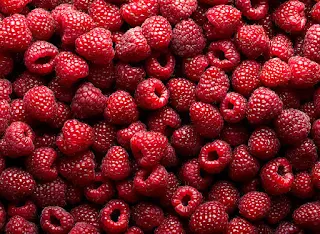Nutritional information
Raspberries are a good source of vitamin C, manganese, and dietary fiber. They also contain smaller amounts of vitamin K, vitamin E, vitamin B2, and vitamin B6. In terms of macronutrients, raspberries are mostly composed of carbohydrates, with small amounts of protein and fat. They are also low in calories, with around 64 calories in a cup of raspberries (123 grams).
Health benefits of raspberry
some information on the potential health benefits of raspberries:
High in antioxidants: Raspberries are rich in antioxidants, including vitamin C, quercetin, and ellagic acid, which help protect your cells from damage caused by free radicals.
May help with weight management: Raspberries contain high levels of fiber and low levels of calories, which may help with weight management.
May help improve heart health: Raspberries contain ellagitannins, a type of polyphenol that may help lower blood pressure and improve cholesterol levels, which can help lower your risk of heart disease.
May help improve brain health: Raspberries are a good source of anthocyanins, which are flavonoids that may help improve brain function and lower the risk of age-related cognitive decline.
May help improve digestion: The high levels of fiber in raspberries can help promote regular bowel movements and prevent constipation.
May have anti-inflammatory effects: The antioxidants in raspberries may help reduce inflammation throughout the body, which can help lower your risk of chronic disease.
It's also important to mention that many studies on health benefits of raspberries are still ongoing and mostly done in labs, So you should always consult with your doctor before making major changes to your diet.
Storage methods of raspberry
There are several methods for storing raspberries, depending on how soon you plan to use them.
Refrigeration: The best way to store fresh raspberries is to place them in a container with a lid or a plastic bag with small holes poked in it, and then refrigerate them. They will last for 2-3 days when stored in this way.
Freezing: Another way to store raspberries is to freeze them. Rinse the raspberries and dry them thoroughly, then place them in a single layer on a baking sheet. Once the raspberries are frozen, transfer them to an airtight container or a resealable plastic bag and store them in the freezer. Frozen raspberries can last for up to 12 months.
Canning: You can also preserve raspberries by canning them. There are many methods to can raspberries, such as hot water canning, pressure canning. Properly canned raspberries can last for a year or more.
Drying: Drying is another method of preserving raspberries, either by air-drying or dehydrator. The dried berries can be stored in airtight container at room temperature for 6 to 12 months.
Regardless of the storage method, it's important to use raspberries as soon as possible after they have been picked or purchased. They are very perishable and will not last as long as other types of fruit.
Best time to consume
There is no specific best time of day to consume raspberries, as they can be enjoyed at any time as part of a balanced diet. Eating raspberries in the morning, such as in a smoothie or as a topping on oatmeal or yogurt, can be a great way to start your day with some added vitamins and antioxidants. They also make a refreshing and healthy snack during the day, and can be added to salads, sandwiches or served with cheese.
In the evening, you can use them as a dessert topping, in a fruit salad or even as an ingredient in a savory dish to add some color and taste.
Additionally, if you are trying to manage your weight or blood sugar levels, it's generally best to consume fruits earlier in the day so that you have time to burn off the natural sugars before you go to sleep.
The bottom line is that you can enjoy raspberries at any time of day, as long as you are including them as part of a balanced diet
Allergy related to raspberry
Raspberry allergies are relatively rare, but they can occur in some individuals. The most common symptoms of a raspberry allergy include itching and swelling of the mouth, throat, and tongue, as well as hives, rash, and difficulty breathing. Anaphylaxis is a severe form of allergic reaction and it's a medical emergency which requires immediate treatment, it's a rare reaction to raspberries but it's still possible.
Symptoms may appear immediately or within a few hours after consuming raspberries. If you experience any of these symptoms after eating raspberries, you should seek medical attention immediately.
It's also worth noting that individuals who are allergic to other berries, such as strawberries, blackberries, and blueberries, may also be allergic to raspberries. If you have a known allergy to any berry, it's best to avoid raspberries as well, or check with your doctor for an allergy test

